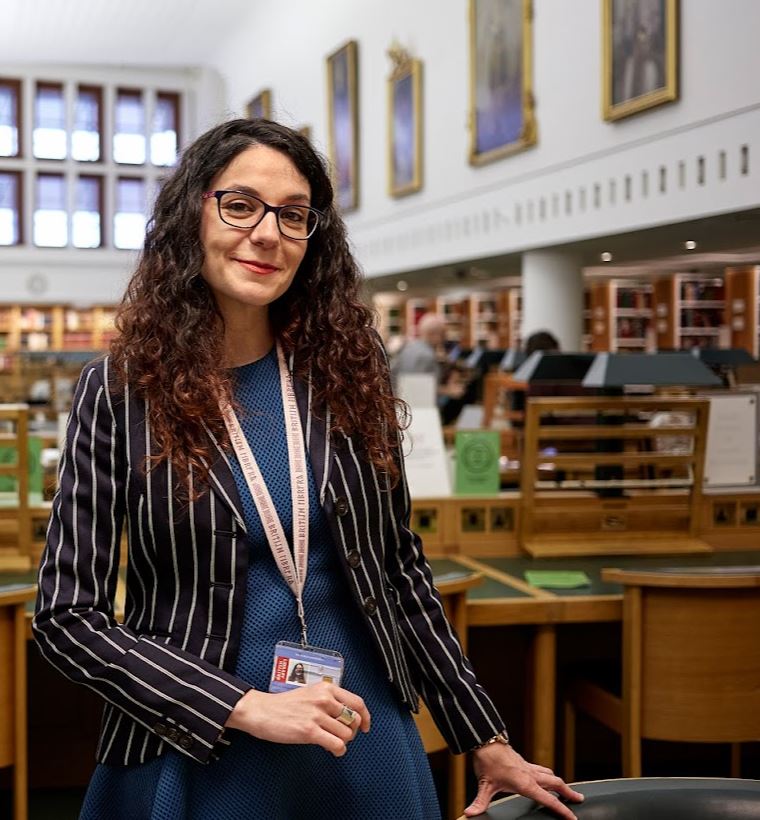Today, I am speaking with Dr Joanne Paul, writer, historian and broadcaster working on the history of the Renaissance, Tudor and Early Modern Period, about how she conducts her research for her publications and the utilisations of archives and records in her lectures.
(Archivoz) Starting with an introductory question, can you tell us a bit about yourself so we can know about your background and interests?
(Joanne Paul) I’m Canadian and did my first two degrees in Canada at Queen’s University (BA) and the University of Victoria (MA). The latter was in Political Science, so when I arrived in the UK to do my PhD in History at Queen Mary, University of London, I had to pick up a variety of historical skills. My focus throughout my career has been on the intellectual, political and cultural history of the sixteenth century, and I often talk about the ‘long sixteenth century’ between the Wars of the Roses and the English Civil War.
(A) As a researcher, could you tell us about your experience working with primary sources? For example, you are working with manuscripts and records from the Middle Ages and Early Modern Period – what is your first approach to these sources? How to you form your first impression of these records?
(JP) In writing my book, The House of Dudley, I worked extensively with archival sources. This ranged from verifying (or falsifying) accepted “facts” to analysing in detail the writing and editing of a single letter or document. As many of these documents are damaged or difficult to read at a glance, I often begin with catalogues or secondary material to get a sense of the context and perhaps some of the content of the document. I don’t like to rely on this material, of course, as I’ve often found mistakes, over-generalisations and missing information, but it gives me a way in. Once I have the document in front of me, I like to begin with a transcription, where that’s possible. In some cases, a published transcription already exists, which is helpful, but I do always try to verify against the manuscript. Not only do mistakes come to light but working from the original document frequently reveals information the printed transcription does not. For instance, famously, John Dudley wrote about Anne Boleyn’s condemnation days before it took place. In analysing the original manuscript, however, you can get a sense of the urgency with which he wrote it – the style of the writing, the frequent edits, and so on.

Cover of the book
Perhaps the great example of this is another letter written by John Dudley, this time to William Cecil in December 1552, right on the eve of the Succession Crisis the next year (SP 10/15 f.137). Dudley had retired from the court and was weighing up whether to return. It is a remarkably reflective – even emotional – letter, and one of the few times Dudley writes about the execution of his father four decades before: “my pore father, who after his m[aster] was gonn suffered dethe, for doinge his masters commandement, who was the wysest prince of the worlde lyvinge in those dayes, And yet coulde not his comandement be my fathers dischardge after he was dep[ar]tyd thys lyffe” [my poor father, who after his master was gone suffered death for doing his master’s commandment, who was the wisest prince of the world living in those days. And yet could not his commandment be my father’s discharge after he was departed this life]. Dudley applies this to his own situation, and this is where the manuscript is especially illuminating. Originally, it reads as follows:
So withe all earnestnes and duty serve w[th]out feare, sekinge nothinge but the true glorye of god, and his highness suertye, so shall you moost pleas god and haue our concensis vpright And then lett [illegible] not feare what man dothe to vs for they canot kyll but the body, and he that sekith to saue that w[th] an vnpure contiens kyllithe the soule
[So with all earnestness and duty serve without fear, seeking nothing but the true glory of God, and his Highness’s surety, so shall you most please God and have our consciences upright. And then let you not fear what man do to us for they cannot kill but the body, and he that seeketh to save that with an unpure conscience killeth the soul.]
This is written as an imperative, perhaps to Cecil specifically but more probably to those who serve the king more generally. The manuscript, however, shows how Dudley later thought better of this, and with his corrections, it reads as below (alterations in italics for clarity):
So for my p[ar]te withe all earnestnes and duty I will serve w[th]out feare, sekinge nothinge but the true glorye of god, and his highness suertye, so shall I moost pleas god and haue my concensis vpright And then not feare what man dothe to me for they canot kyll but the body, and he that sekith to saue that w[th] an vnpure contiens kyllithe the soule
[So for my part with all earnestness and duty I will serve without fear, seeking nothing by the true glory of God, and his Highess’s surety, so shall I most please God and have my consciences [sic] upright. And then not fear what man do to me for they cannot kill but the body, and he that seeketh to save that with an unpure concience killeth the soul.]
Finally, the calendar entry only has this:
Though my father, after his master was dead, died for doing his master’s commands, I will serve without fear, seeking God’s glory and his highness’s surety. They can but kill the body; he that seeks to save that with impure conscience kills the soul.
As we can see, Dudley changes the tone of this crucial part of the letter to reflect solely his own views, rather than trying to apply them more widely. Why he does this is, of course, a matter for speculation, but by examining the MS itself, we can see this alteration of one of the few letters that open a window on Dudley’s thinking.
(A) You have a career as a university lecturer. How do you go about teaching students in how to interact with these resources? How do you encourage people to look at such records, considering that they can be intimidated during their first time?
(JP) In teaching my first years, I try to put primary sources in front of them as soon as possible. Usually these are modernised, but images can be a useful way to get new students interacting with original sources early. I also do a session with a few 17th and 18th century books I’ve purchased from eBay, so they can start to get used to handling a rare book and gathering information from it. In the second year I start introducing original manuscript sources. I begin with Edward VI’s Device for the Succession, as his hand is very easily parsed by modern readers, and there are fascinating edits that don’t come through in some transcriptions, so it’s a brilliant lesson in the importance of consulting the original source. I find for the most part students are captivated by the idea of getting that close to the past.
(A) As a writer, researcher, and professor, how do you feel about accessing these records in archives and libraries? Is there anything that prevents you from visiting archives or libraries for your research?
(JP) I would say, on average, I consult far more original resources online than in person. I’m very lucky to have access to, for instance, State Papers Online, which houses many of the manuscripts that I require to do my work. The cost and time of travel mean that I tend to access digitised records online when they are available. The digitisation of resources has the potential to make them more accessible, though at times the fees are prohibitive, especially for independent scholars. Of course, when possible (and required) I love working with the original sources, and get a lot from it. One of my favourite research days was spent with manuscripts at the College of Arms, which can really only be appreciated in person.
Header image is a fragment of the letter from Robert Dudley, Earl of Leicester to Elizabeth, 29 August 1588 (SP 12/215 f.114). Classroom resources, National Archives
Other images courtesy of Joanne Paul
Interviewee:

Joanne Paul
Honorary Senior Lecturer in Intellectual History at the University of Sussex and a writer, historian and broadcaster
Joanne Paul is Honorary Senior Lecturer in Intellectual History at the University of Sussex and a writer, historian and broadcaster working on the history of the Renaissance, Tudor and Early Modern Periods. She has written for the Cambridge University Press ‘Ideas in Context’ series, and has been widely praised for her work on Thomas More, William Shakespeare, Machiavelli and Thomas Hobbes.
The House of Dudley is her acclaimed history of the Dudley family. Picked as a Times Book of the Week and Book of 2022, The House of Dudley also garnered excellent reviews in The Telegraph, The Sunday Times, Mail on Sunday, Literary Review, Spectator and was featured in History Today and BBC History Magazine.
Interviewer:

Noemi Ortega Raventos
Global Director, Archivoz Magazine
Noemi is a Content Specialist, Archivist for the Qatar Foundation Partnership Programme at the British Library, Director at Archivoz Magazine and Board Member of SEDIC (Spanish Society for Scientific Documentation and Information). She received her MA in Archives and Records Management from ESAGED/UAB (Graduate School of Archival and Record Management/Autonomous University of Barcelona) in 2014. She holds a BA Degree in History and MA in Medieval Studies from UB (University of Barcelona).



